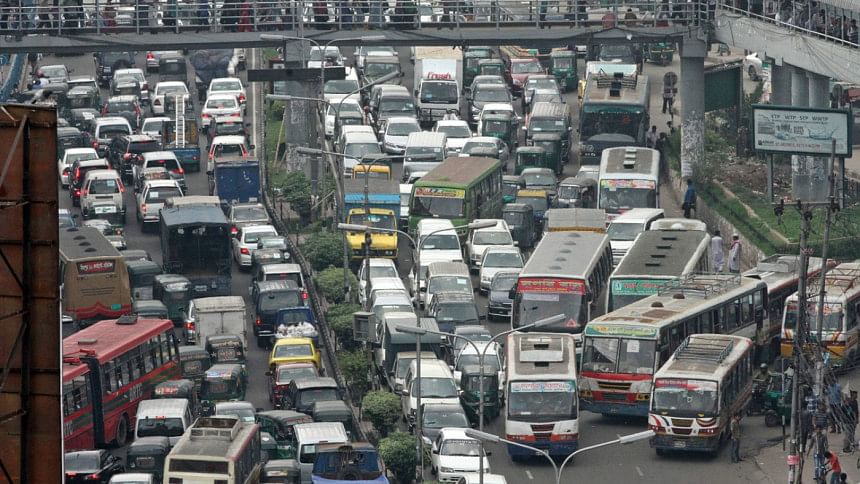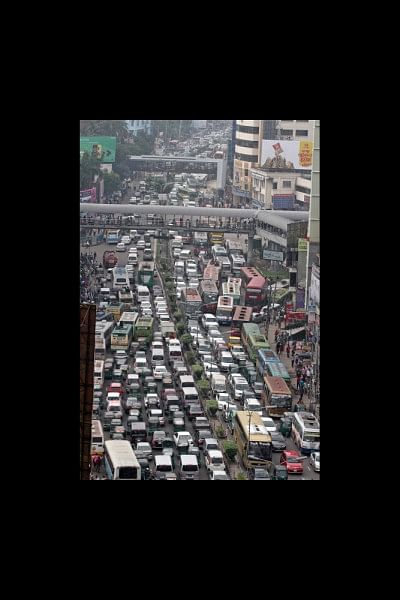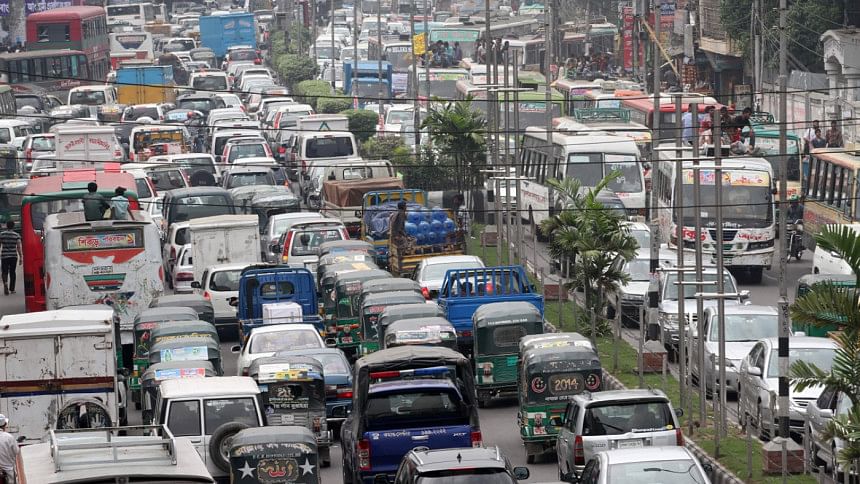Gridlock costs economy $12.5b a year: study

Bangladesh can double its economic growth by just eliminating traffic congestion from Dhaka city, helping the government's efforts to move the economy beyond the 6 percent-plus output, according to a new study.
Gridlock costs the country $12.56 billion a year, equivalent to about 7 percent of the GDP, said Sonjoy Chakraborty, deputy director of the Board of Investment, who conducted the study.
If Dhaka can be freed from the crisis, the country's per capita income would go up by $78 to $1,392 from the current figure of $1,314, he said.
“Without congestion, economic growth would move up to 13 percent from the average 6 percent,” Chakraborty said at a seminar on traffic congestion in Dhaka and its economic impact, at the BoI office yesterday.
The researcher arrived at the estimate by adding up the cost of lost travel time, avoidable social cost and the expenses linked to fuel, vehicles and road accidents.
The new number is much higher than the previous estimates.

Traffic snarls cost the economy $3.492 billion a year based on data of the 2010-11 period, according to a study conducted by Tanzila Khan, senior lecturer at Stamford University Bangladesh and Md Rashedul Islam, an assistant engineer of Bangladesh Water Development Board. It was published in the International Journal of Engineering Science and Innovative Technology.
Traffic congestion in the capital causes a loss of about $1.68 billion a year, said SM Salehuddin, then additional executive director of Dhaka Transport Coordination Board, in 2010.
To reduce traffic congestion, Chakraborty recommended administrative decentralisation, work redistribution among government agencies, creation of metropolitan government, empowerment of local government, introduction of e-governance and quality health care and education in the district and rural areas.
A robust public transport system must be introduced, he said.
Because of a lack of adequate public transport, middle- and upper-middle income people use cars, occupying 78 percent of road capacity but carrying only 5 percent of trips, according to Chakraborty.
A number of strategic decisions can help reduce the congestion immediately and these decisions will not require a lot of money to implement, he said.
BoI Executive Chairman SA Samad, who moderated the seminar, said the causes of traffic congestion have been identified but “we are not becoming a part of the solution”.
“There is only one solution: follow the rule. We have laws but there is a lack of enforcement.”
Something must be done about traffic congestion immediately, he said. “The solution has to be shorter than the short-term.”
The government is afraid of taking steps which might be unpopular and cost votes, according to Samad.
Md Azizur Rahman, chairman of the economics department at Notre Dame University in Dhaka, said he set off an hour before the start of the seminar from Khilgaon that typically should not take more than half an hour to cover.
“Because of traffic, I was half an hour late.”
Aminul Bar Chowdhury, a member of Bangladesh Land Port Authority, said the government has been trying for the last six years to take GDP growth beyond the 6 percent growth cycle.
“Even if the rate goes up by two percentage points, I would be happy.”
Md Abdul Hannan, managing director of Bangladesh Overseas Employment and Services Ltd, said he attended a seminar on traffic congestion at the National Press Club 28 years ago, when he was a university student. “We are still talking about the issue.”

“The disease has long been identified. If we do not make arrangements for its treatment, time will come when no treatment will work.”
Showkat Ali, secretary of Bangladesh Road Transport Authority, said the government has taken a number of steps to reduce congestion. “We have to improve traffic management. We have short-, mid- and long-term strategies, some of which we are implementing.”

 For all latest news, follow The Daily Star's Google News channel.
For all latest news, follow The Daily Star's Google News channel. 



Comments